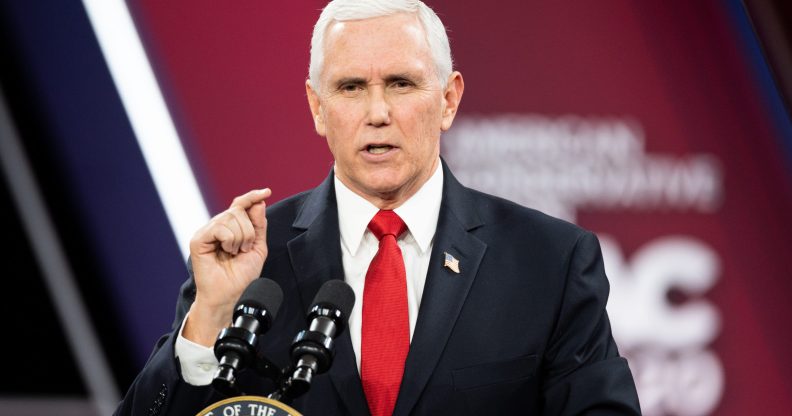Mike Pence’s botched handling of HIV crisis rears its ugly head as Trump hands him responsibility for coronavirus

Mike Pence oversaw a major HIV crisis in 2015. (Michael Brochstein/ Echoes Wire/Barcroft Media via Getty)
Mike Pence was governor of Indiana when it experienced “the largest concentrated outbreak of HIV ever documented in the United States” in 2014-15.
Pence’s contribution to the crisis has been put under the microscope after Donald Trump put the vice president in charge of America’s response to the Covid-19 coronavirus.
It was back in early 2015 when public health officials noticed a spike in new HIV and hepatitis C transmissions in Austin, Indiana, with NPR reporting it as the “largest HIV outbreak in Indiana’s history” at the time.
Most the cases were linked to drug use, specifically the injection of prescription opioids.
At the time there was a ban on needle exchanges throughout the state, despite such programmes being a proven method of HIV prevention.
Before the crisis broke, Pence was a fervent critic of needle exchanges, and continued to oppose them for months after the crisis emerged.
It wasn’t until the end of March 2015 that he announced a state of emergency and said he was “prepared to make an exception to my long-standing opposition to needle-exchange programs”.
By this time Scott County had identified 80 new HIV transmissions, up from an annual average of five. The 4,200 population town would eventually count 215 new cases, a 5 per cent rate.
Two months later Pence signed a law allowing for needle exchanges across the state.
Mike Pence defunded Planned Parenthood, eliminating Indiana’s HIV test centres.
Compounding the issue was the complete lack of HIV testing centres in Scott County.
A Planned Parenthood which was the county’s only such facility closed in 2013, Mike Pence’s first year as governor, because of public health spending cuts.
Two years earlier, in 2011, the House of Representatives had passed an amendment to defund Planned Parenthood, tabled by then congressperson Pence.
Criticism continues to this day.
In 2017 Dr Tom Frieden, former director of the US Centers for Disease Control and Prevention, called the Austin outbreak the largest fuelled HIV outbreak to hit rural America in recent history, and “the largest concentrated outbreak ever documented in the United States.”
It was suggested in a 2018 study that if Pence had acted sooner in introducing needle exchanges, the number of new HIV cases could be been reduced “substantially”.
After the announcement that Pence would head up the White House’s response to the coronavirus, Democrat Alexandria Ocasio-Cortez said the vice president of “literally does not believe in science”.
“It is utterly irresponsible to put him in charge of US coronavirus response as the world sits on the cusp of a pandemic,” she tweeted.
This decision could cost people their lives. Pence’s past decisions already have.
Gregg Gonsalves, assistant professor of epidemiology at Yale University, said that the decision “endangers us all”.
“It’s like putting an arsonist in charge of the fire department, a bank robber in charge of the US Mint,” he tweeted.
“This isn’t a Republican or Democratic issue – we have the potential for coronavirus outbreak in the US and we needed to rise above the partisan fray.”
Mike Pence defends his record.
In the face of renewed criticism, Mike Pence appeared on Fox News on Thursday, February 27, saying: “Indiana would go on to change the law to mirror what action I had taken, but it was a moment where we had brought all of the resources to bear, first from a health perspective, a law enforcement perspective, and I’m glad to say that we got all of those people treated.”
He added that he maintains his opposition to needle exchanges as a way to combat drug abuse, “but in this case we came to the conclusion that we had a public health emergency and so I took executive action to make a limited needle exchange available.”

